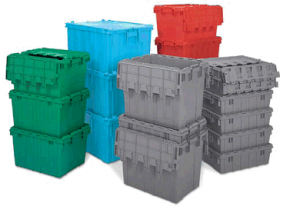 When an organic farm in northern California recently made the switch from wax-coated cardboard boxes to reusable plastic totes, the goal was to try to reduce its carbon footprint in order to help the environment.
When an organic farm in northern California recently made the switch from wax-coated cardboard boxes to reusable plastic totes, the goal was to try to reduce its carbon footprint in order to help the environment.
But the operators of Full Belly Farm ended up saving more than $14,000 per year in packaging costs. Now that’s what’s known as “good karma”.
An Environmentally Safer Solution
Fully Belly Farm — which is located in Guinda, California, about 40 miles northwest of Sacramento — provides organically grown vegetables, fruits, nuts, flowers and eggs for individuals, restaurants and grocers throughout the region.
Just two years ago, most of these all-natural products were shipped in 8,330 waxed cardboard boxes. While each box could be reused between four and five times before it had to be replaced, because it was covered in wax it couldn’t be recycled and had to go directly to the landfill.
But in 2015, the farm’s operators replaced these boxes with 2,000 reusable plastic totes that feature ventilation holes and attached lids. The totes –which measure 19.9″ X 11.6″ and are 7.6″ deep, can be used over and over again without having to be replaced or dumped. Plus, they are durable enough to stand up to the area’s wide temperature variations and unpredictable weather conditions.
Vertical Integration Usage
The plastic totes can be used for every aspect of the farm’s operation. Workers picking ans washing the produce can pack the fresh fruits and vegetables directly into the plastic totes, which can then be stored for several hours in a cooler before being loaded onto a truck and shipped to customers, many of whom are more than 150 miles away.
The farm’s clients can then switch out empty totes for full ones, which are then returned to the farm where they can be cleaned and put back into circulation.
Big Savings
The switch to plastic totes saved the farm the $14,161 it spent on buying waxed cardboard boxes each year. But there also was labor savings because workers no longer need to form and stack boxes at the beginning of every shift anymore. Instead, clean new totes can be lined up and be ready for use with no assembly required.
And then there are the savings in waste. Switching to reusable totes saved the farm an estimated 6.54 tons of cardboard waste per year, enough to reduce greenhouse gas emissions by 34.1 tons annually, according to a case study of the farm compiled by the Reusable Packaging Association.
Long-Term ROI
One of the biggest benefits of making the switch was that it will continue to pay dividends for many years to come, according to Judith Redmond, the farm’s co-owner.
“These savings will continue every year, as long as the boxes last, and we expect that will be 10 or 15 years at least,” Redmond said. “Also, the price of cardboard boxes continues to go up. So our totes will become more and more valuable over time. Our total dollar savings will be at least ten times the number that we save in one year.”
The farm’s actions have not gone unnoticed. In 2014, it was awarded the RPA’s Excellence in Reusable Packaging Award.
